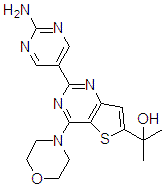All AbMole products are for research use only, cannot be used for human consumption.

GNE-493 is a potent, selective and orally available pan-PI3-kinase and dual pan-PI3-kinase/mTOR inhibitor for the treatment of cancer. The PI3K/AKT/mTOR pathway has been shown to play an important role in cancer. GNE-493 is highly selective, demonstrate knock down of pathway markers in vivo, and is efficacious in xenograft models where the PI3K pathway is deregulated.
| Cell Experiment | |
|---|---|
| Cell lines | PC3 and MCF7.1 cells |
| Preparation method | Antiproliferative cellular assays were conducted using PC3 and MCF7.1 human tumor cell lines provided by the ATCC or Genentech Research laboratories, respectively. MCF7.1 is an in vivo selected line developed at Genentech and originally derived from the parental human MCF7 breast cancer cell line (ATCC, Manassas, VA). Cell lines were cultured in RPMI supplemented with 10% fetal bovine serum, 100 units/mL penicillin, and 100 μg/mL streptomycin, 10 mM HEPES, and 2 mM glutamine at 37 C under 5% CO2. MCF7.1 cells or PC3 cells were seeded in 384-well plates in media at 1000 cells/well or 3000 cells/well, respectively, and incubated overnight prior to the addition of compounds to a final DMSO concentration of 0.5% v/v. MCF7.1 cells and PC3 cells were incubated for 3 and 4 days, respectively, prior to the addition of CellTiter-Glo reagent (Promega) and reading of luminescence using an Analyst plate reader. |
| Concentrations | 0~10 μM |
| Incubation time | 3 and 4 days |
| Animal Experiment | |
|---|---|
| Animal models | Nu/nu(nude) female mice bearing PC3 prostate cancer xenografts |
| Formulation | 0.5% methylcellulose/0.2% Tween-80 |
| Dosages | 10mg/kg daily for 14 days |
| Administration | orally |
| Molecular Weight | 372.44 |
| Formula | C17H20N6O2S |
| CAS Number | 1033735-94-2 |
| Solubility (25°C) | DMSO ≥ 35 mg/mL |
| Storage |
Powder -20°C 3 years ; 4°C 2 years In solvent -80°C 6 months ; -20°C 1 month |
| Related PI3K Products |
|---|
| T-00127-HEV1
T-00127-HEV1 is a phosphatidylinositol 4-kinase III beta (PI4KB) inhibitor with an IC50 of 60 nM. |
| PI3Kγ inhibitor AZ2
PI3Kγ inhibitor AZ2 is a highly selective PI3Kγ inhibitor (The pIC50 value for PI3Kγ is 9.3). |
| NIBR-17
NIBR-17 is a pan-class I PI3K inhibitor with suitable pharmacokinetic properties and inhibits tumor growth. |
| RV-1729
RV-1729 is an inhibitor of the phosphatidylinositol 3-kinase-δ (PI3Kδ). |
| Vulolisib
Vulolisib is a potent and orally active phosphatidylinositol 3-kinase (PI3K) inhibitor, with IC50 values of 0.2 nM, 168 nM, 90 nM and 49 nM for PI3Kα, PI3Kβ, PI3Kγ and PI3Kδ, respectively. |
All AbMole products are for research use only, cannot be used for human consumption or veterinary use. We do not provide products or services to individuals. Please comply with the intended use and do not use AbMole products for any other purpose.


Products are for research use only. Not for human use. We do not sell to patients.
© Copyright 2010-2024 AbMole BioScience. All Rights Reserved.
